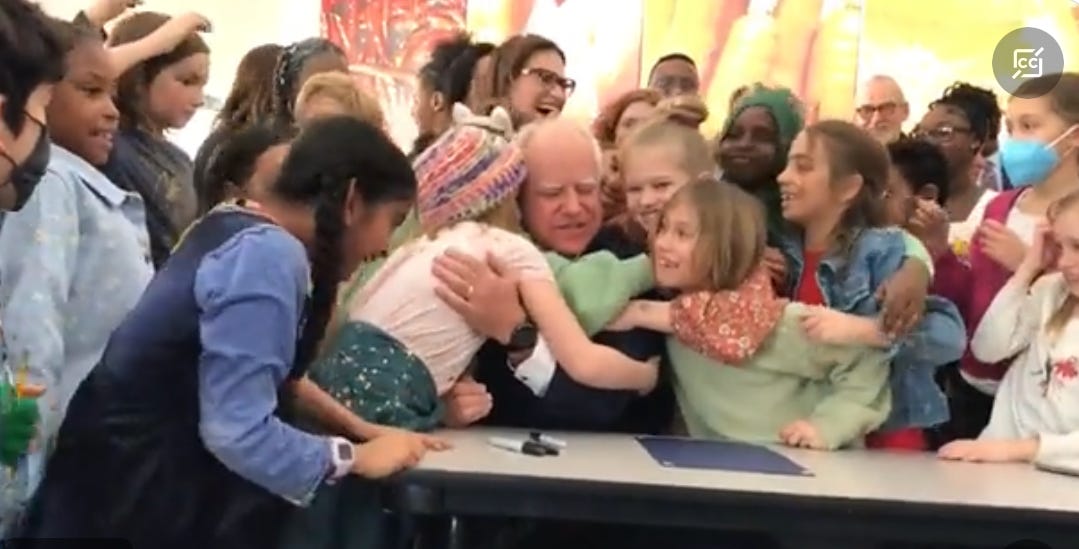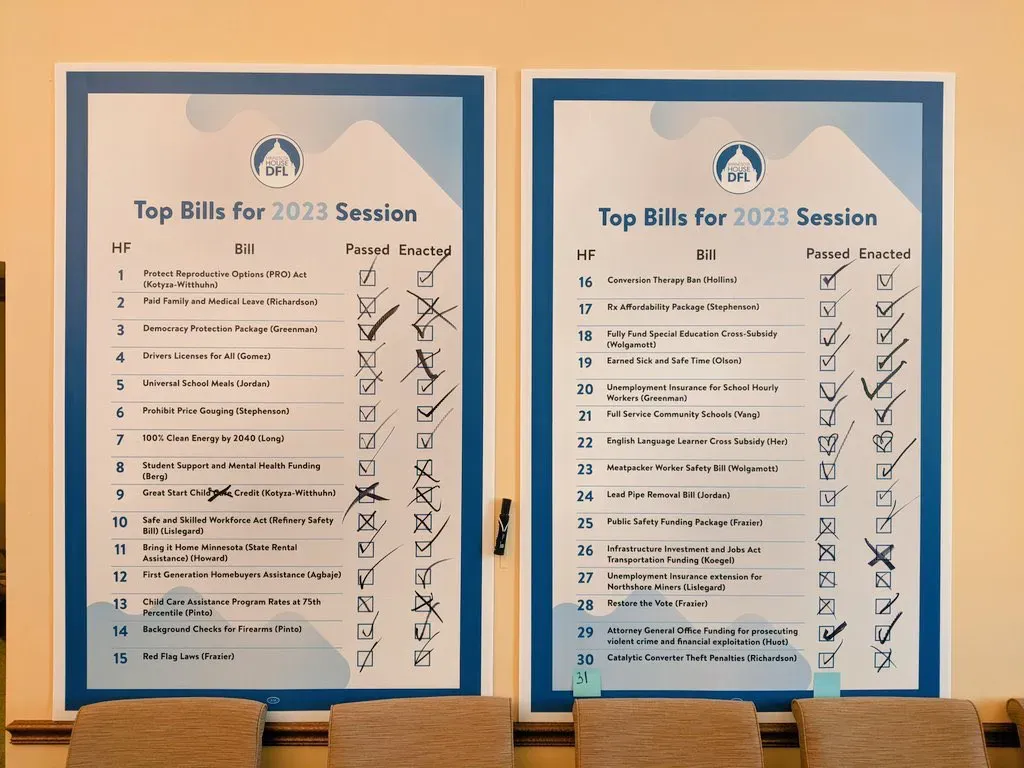Sometimes you just have to gush. Earlier this week, the Minnesota legislature completed its first 2023 session, sending what’s become known as the state’s “One Budget” to the desk of governor Tim Walz. On Wednesday, he signed the massive $72 billion enactment into law.

statuskuo.substack.com
The Minnesota Miracle
JAY KUO
MAY 25, 2023
Sometimes you just have to gush.
Earlier this week, the Minnesota legislature completed its first 2023 session, sending what’s become known as the state’s “One Budget” to the desk of governor Tim Walz. On Wednesday, he signed the massive $72 billion enactment into law.
The budget caps a monumental session for the state’s Democratic lawmakers, known in Minnesota as the Democratic-Farmer-Labor Party or DFL. Through painstaking, grassroots activism, the DFL gained three state senate seats in 2022 to win a
single seat majority in that chamber. That meant, for the first time in eight years, that the DFL held a majority in
both chambers of the legislature and, with Walz in the governor’s mansion, there was a trifecta for Democratic government.
This time, the party wouldn’t waste any of its momentum. With many younger, first-time committee chairs in place, progressive leaders in the House, banking on their one-vote margin in the state Senate, pushed forward with a long-sought agenda to transform Minnesota. They tackled everything from labor laws to climate change, education to voting rights, bodily autonomy to gun safety. And they did it in five furiously paced months of hard work.
It was a 30-point checklist, and they hit all of their priorities. They paid for the programs with increases on sales taxes in the Twin Cities metro area, increases in vehicle registration fees, taxes on companies receiving global income, and reduced deductions for the wealthy. The GOP predictably hated these tax increases and complained bitterly about its inability to prevent the legislation from advancing. But unless and until they have their own trifecta in place, it will be hard to undo much of this.
Today I want to walk through these groundbreaking legislative victories for three reasons.
First, they are a model for what is possible under unified Democratic governance, and other states should take note. (I’m looking at you, New York.) Second, they show that moderates and progressives within the Democratic Party can come together and pass meaningful, transformative legislation, even if they have to ignore Republican protests and overcome their intransigence and obstruction. And third, with so much of the former Confederacy backsliding into an authoritarian hellscape, we really need some wins to celebrate. And boy are these some wins.
So let’s talk about the
New Vikings and what they did. In this summary, I’m borrowing heavily from the research and list created by metro policy analyst
Will Stancil, from
PBS, from
Democracy Docket, and from local media such as the
Duluth News Tribune.
Pro family and pro-healthcare laws
The centerpiece of the budget created a taxpayer-funded, paid family and medical leave program for the state’s workers. It establishes 12 weeks of medical leave with a 20-week annual cap. Participation by businesses is mandatory unless they privately offer equivalent benefits. This will primarily affect the nearly one million low wage workers in the state who prior to this had
no paid time off.
Workers will receive compensation based on their wages—and 90 percent of normal pay for those under the state average wage, and between 50 to 66 percent for those above the average. The law raised the number of workers receiving paid leave from 25 percent to
100 percent.
The vote passed 34-33 along party lines.
The program’s launch is funded by $668 million out of the budget surplus of $17.5 billion, and its continuing costs come from a new payroll tax of 0.7% split between employers and employees—an average of around $3 extra per worker in taxes each week. The program begins in 2026; the time is needed to establish a new office to administer the program.
The budget also assists poor families with children by authorizing a child tax credit. It will provide up to $1,750 per child for low income families, filling in a big gap left when the federal government, thanks to Joe Manchin (D-WV), failed to renew the pandemic-era federal child tax credit.
In other healthcare wins, the state will now have a Prescription Drug Affordability Board that will set price caps for costly drugs. It also bumped up salaries for home health workers to help address a shortage of in-home nurses.
The Dems also expanded protections for pregnant and nursing workers to everyone, not just those working for big companies, and made childcare more affordable.
Bodily autonomy laws
The legislature codified the protections of
Roe v. Wade that the U.S. Supreme Court had stripped away in its 2022
Dobbs decision. With this law’s passage, the state’s Republicans won’t be able to use the courts to endanger abortion rights. The abortion rights bill in particular was a priority, and Minnesota was the
first state to pass new legislation to put such protections into place. The DFL credits voter enthusiasm around abortion rights for fueling their victories in the state Senate, granting them the power to enshrine abortion right protections at the state level without regard to what the courts decide.
The LGBTQ+ community also has good reason to be proud. A
set of laws has elevated Minnesota as a trans refuge state, telling trans youth and the trans community at large, “You belong here.” Specifically, state courts are forbidden from complying with child removal requests, arrests, extraditions or subpoenas relating to gender-affirming health care that someone receives in the state. The state also banned the practice of conversion therapy.
Pro-union and pro-worker laws
Labor had a very good session with the Minnesota DFL Party. A sweeping bill bans noncompete agreements; adds workplace safety inspectors; and protects workers in places like nursing homes, Amazon warehouses, meatpacking plants, construction sites, hospitals and public schools. It also allows unionized teachers to negotiate over class sizes and makes hourly school workers eligible for unemployment during summer break.
A massive shot in the arm for education
Top line, the DFL raised education spending by an impressive 10 percent in the state, spending around $2.3 billion extra on it.
A new law makes breakfasts and lunches free for all public school students. (I have to include this adorable screenshot from a video of the governor being mobbed by kids at the signing…)
Photo credit: John Croman on Twitter
 ), that new agenda is
), that new agenda is 
 ), that new agenda is
), that new agenda is 
 ), that new agenda is
), that new agenda is 









 Nice to have MN be another good beacon of hope. Usually just IL pushes things around cause Dems here are basically enshrined into majority. I hope MI and WI get bluer with time.
Nice to have MN be another good beacon of hope. Usually just IL pushes things around cause Dems here are basically enshrined into majority. I hope MI and WI get bluer with time.